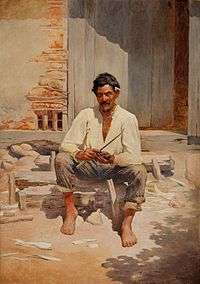Caipira

Caipira (Portuguese pronunciation: [kajˈpiɾɐ]; (Old Tupi ka'apir or kaa - pira, which means "bush cutter") is a Brazilian Portuguese term used to describe inhabitants of rural, remote areas of Brazil. It can be considered pejorative when used to describe others, but it can also be used as a self-identifier without negative connotations. In the traditional festas juninas people who are not otherwise considered as such dress up as stereotypical Caipiras.
It is also used as a name for a group of dialects of Portuguese in the states of São Paulo and neighboring areas in Mato Grosso do Sul, Goiás, the south of Minas Gerais, and part of Paraná. By extension, the term caipira can also be applied to the different cultural manifestations of the caipiras, such as their music. The diminutive form derived from the caipira noun, caipirinha, is known as a cocktail worldwide.
References
- Cândido, Antônio. Os parceiros do Rio Bonito Sp, José Olympio, 1957.
- Monteiro Lobato, José Bento de. Urupês, Editora Monteiro Lobato e Cia., 1923.
- Nepomuceno, Rosa., Música Caipira, da roça ao rodeio, Editora 34, 1999.
- Queiróz,Renato da Silva. Caipiras Negros no Vale do Ribeira, Editora da USP, 1983
- Pires, Cornélio . Conversas ao pé do fogo - IMESP, edição fac-similar, 1984.